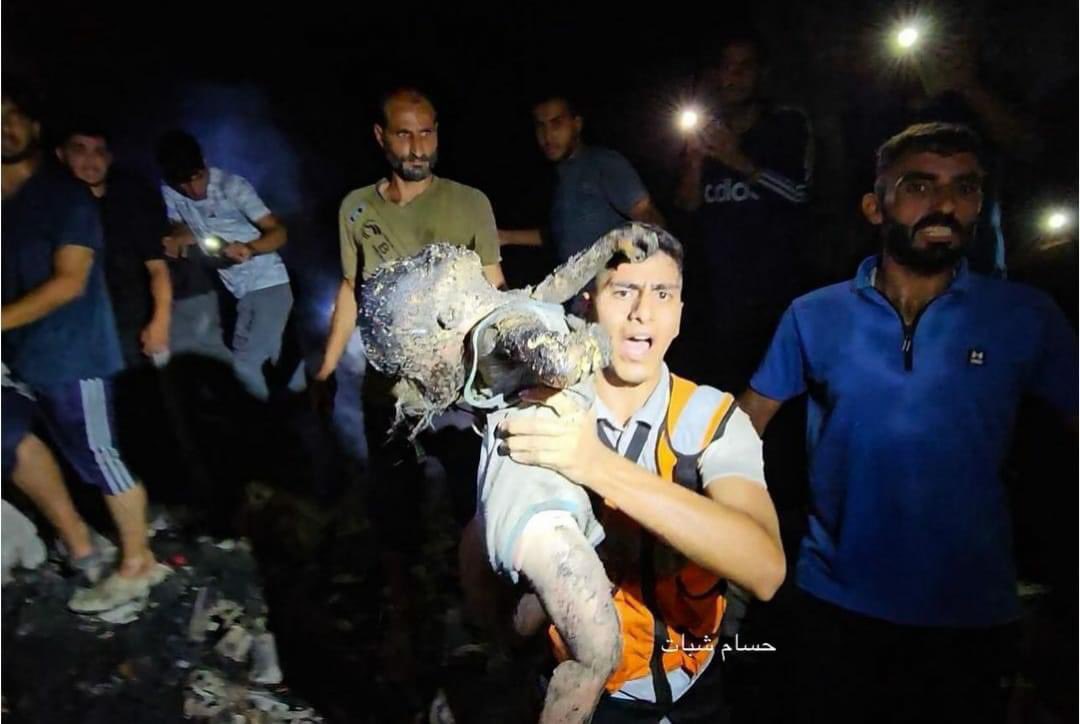www.aljazeerah.info
Opinion Editorials, July 2024
Archives
Mission & Name
Conflict Terminology
Editorials
Gaza Holocaust
Gulf War
Isdood
Islam
News
News Photos
Opinion Editorials
US Foreign Policy (Dr. El-Najjar's Articles)
www.aljazeerah.info
How Israel's Genocide in Gaza Is Creating Enemies on All Sides By David Hearst PIC, September 13, 2024 |
 |
 |
|
|
As the US-backed Israeli genocidal war on the Gaza Strip entered
day 342, Israeli aerial and artillery strikes continued massacre more Palestinian civilians, September 12, 2024. |
How Israel’s genocide in Gaza is creating enemies on all sides
When three Israeli security guards were killed near the Allenby Bridge border crossing between Jordan and the occupied West Bank last week, Prime Minister Benjamin Netanyahu proclaimed that Israel was “surrounded by a murderous ideology led by Iran”.
In December, his government said Israel was fighting a war on seven fronts, all led by Iran.
If this is an acknowledgement that Netanyahu’s refusal to end the genocidal campaign in Gaza is making all of Israel’s borders insecure, then it is belated. However, Netanyahu was right to say there is hatred for Israel on the east side of the Jordan Valley.
As the popular celebrations that followed the killings showed, Jordanians have no need for Iran’s active incitement.
The Israeli military’s genocidal campaign in Gaza and the settlers’ terrorism against the Palestinians in the West Bank have sowed the seeds of hatred in a neighbor all by itself. Jordan, which has been quiet for 50 years on the Palestinian question, is quiet no more.
Gaza has radicalized the Arab world in a way not seen for over a decade since the Arab Spring.
Tribal might
First and foremost, Maher al-Jazi, the truck driver who carried out the attack, came from the southern Jordanian town of Udrah in Maan governorate. Haroun al-Jazi, a one-time leader from the same tribe, led Eastern Jordanian volunteers to fight in the 1948 Battle of Jerusalem.
Maher is also a descendant of Mashour al-Jazi, the commander of the Jordanian army during the battle between Israeli forces and the Palestinian Liberation Organization (PLO) and Jordanian armed forces over the border town of Karameh in 1968.
Al-Jazi’s town and clan bode ill for those in the willfully under-informed western embassies in the region, who hope that the embers of this fire can be stamped out soon.
For, if the western side of the 335km-long border is being rapidly militarized by the Israeli army and up to a million armed settlers, all that is securing the eastern side of this border are the Jordanian tribes and the Jordanian army which recruits heavily from them.
What tribal leaders thought of the shooting is, therefore, significant for the future stability of this border.
I will never forget how easily the tribes were dismissed by King Abdullah when he was at the controls of a Black Hawk helicopter, of which he has a squadron for his personal use.
The scene was straight out of Hollywood, but it worked. His passenger, US journalist Jeffrey Goldberg, was suitably impressed and wrote it up for The Atlantic.
The king was going to lunch with tribal leaders in Karak: “I’m sitting with the old dinosaurs today,” Abdullah told Goldberg.
That was a few months before the end of the Arab Spring in 2013.
Today, the king would not dare call tribal leaders “old dinosaurs” unless of course he, too, was heading for extinction.
In these troubled times, the Hashemite monarchy depends, more than ever before, on the tribes as the foundation stone of its legitimacy, one that is frayed by a prolonged economic slump.
What tribal leaders say is taken as a bellwether of the national mood.
Homegrown rage
On Monday, there was no hint of condolence or apology in their statements.
The Al-Huwaitat clan carried a statement from the family, who said the full responsibility for what happened at the border crossing lay solely with the Israeli prime minister, and added: “The blood of our martyred son is not more precious than the blood of our Palestinian people and he will not be the last martyr.”
The head of the Bani Sakhr tribe, Sheikh Trad al-Fayez, welcomed this “heroic operation” which “expresses our people and our nation”. It went on: “The peoples of the nation must take a decisive, honorable and firm stance in confronting this aggression.”
No fingerprints of Iran or any foreign power are to be detected in any of this. The rage is homegrown.
Ahmad Obeidat, a former prime minister and intelligence chief, had said something similar before the shootings took place. Obeidat has never seen his country as united behind the cause of Palestinian resistance. “This battle is everyone’s battle. Because fate is one. And the enemy that targets Palestine clearly will target Jordan,” he said.
Obeidat saw this as a natural consequence of Israel deciding that the time to manage the conflict was over: “Either you [Israelis] kill the Palestinian people or you displace them. You kill them or displace them. This is happening in front of us,” he said.
He declared: “Any Arab or Muslim who surrendered a grain of the soil of historic Palestine – not just the 22 percent left to negotiate on 4 June 1967 – [is] a traitor to their country, their nation and their religion.”
Another indication of the national mood in Jordan is the preliminary results of parliamentary elections under a system designed to restrict the ability of one political force to win seats even if it has a majority of the votes.
Nevertheless, the Muslim Brotherhood’s Islamic Action Party won 18 out of 40 seats according to preliminary results. They are expected to get 14 more seats from localities, giving them about 32 seats out of 130, which would make them the largest single party.
A fundamental security challenge
This degree of engagement, 11 years after the crushing of the Arab Spring, cannot be seen solely as the product of Israel opening a second front to its Gaza campaign in the West Bank.
Nor is it a product of warnings given by Israeli Foreign Minister Israel Katz about the need for “temporary evacuations” in “some cases of intense combat”. Nor of Finance Minister Finance Bezalel Smotrich revealing in June that his government was changing, clandestinely, the way the West Bank was governed, achieving annexation in all but name.
It’s hard to distinguish between the settlers and the soldiers, who one day harass Palestinian farmers, and who the next day are filmed shooting at them
Nor indeed of the digital map Netanyahu produced in which Jordan was given the same color as Gaza while the West Bank had been erased altogether.
If I could point to one document, one testimony as to how Israel’s actions and words pose a fundamental security challenge to Jordan and, indeed, to all its Arab neighbors, it would be a recent investigation by the BBC into how settlers are seizing large swathes of land through farming outposts, which are illegal in both Israeli and international law.
In February, Moshe Sharvit, a settler sanctioned by the UK and the US for violence and intimidation against Palestinians, hosted an open day at his outpost which was filmed.
Sharvit explained how effective he was at seizing land: “The biggest regret when we [settlers] built settlements was that we got stuck within the fences and couldn’t expand,” he told the crowd. “The farm is very important, but the most important thing for us is the surrounding area.”
Sharvit claimed to control 7,000 dunams (7 sq km) of land. The settlers are laughing as they bully, harass and shoot Palestinian farmers off their land. They are stormtroopers preying on impotent victims. They swagger. They smile.
There are now 196 outposts, which are illegal under Israeli law. These posts have doubled in number in the last five years, well before the Hamas attack on 7 October.
I defy any viewer to look at this documentary and not feel the anger well up inside.
Sharvit isn’t acting alone. The Israeli human rights group Peace Now obtained contracts showing how two organizations with official ties to the Israeli state are providing the money for such land grabs.
One of them is Amana which loaned $270,000 to a settler to build greenhouses on an outpost. According to the BBC investigation, Amana’s CEO Ze’ev Hever can be heard in a leaked recording from a meeting of executives in 2021 saying: “In the last three years… one operation we have expanded is the herding farm [outposts]. Today, the area [they control] is almost twice the size of built settlements.”
Canada sanctions Amana for “violent and destabilizing actions against Palestinian civilians and their property in the West Bank”.
Another organization helping the herd farming outposts is the World Zionist Organization (WZO) whose settlement division is responsible for managing some land occupied by Israel in 1967.
This division describes itself as an “arm of the Israeli state”. It also has international affiliates and partners. At least one of them is a registered charity in Britain.
The BBC offered Amana and the WZO a right of reply, but neither replied.
Middle East Eye offered WZO another opportunity to put their case, but none had been received from them by the time of publication.
The US, Canada and the UK sanction violent settlers, while they leave their funders and their partners free to operate in Britain and America.
How can this be? Surely this deserves greater scrutiny.
Breeding hatred
It is difficult to avoid the conclusion that our governments only concern themselves with the last and most visible link in an international chain which starts here at home.
It’s hard to distinguish between the settlers and the soldiers, who one day harass Palestinian farmers, and who the next day are filmed shooting at them.
It’s harder still to draw a line between the settlements and outposts and what was once fondly but erroneously referred to as “Israel proper”.
This matters, or should matter, to the US, UK, the EU or any European country that claims to support the establishment of a Palestinian state. Because it is here in two-thirds of the land of the West Bank that the Palestinian cause for self-determination is being buried, as Smotrich well knows.
Every seizure of every dunum of land is an act of war in this battle, the only battle that counts. And it’s a war being conducted by the whole state of Israel and the whole Zionist community worldwide.
No defense exists of the right of such a state to “defend itself” when it itself is constantly and silently on the attack.
No wonder Israel breeds and fosters the hatred of its neighbors. This hatred is richly deserved. If anything, it is understated.
For it’s not just Israel that can reach the conclusion that “it’s us or them”. Its neighbors can do the same.
-David Hearst is co-founder and editor-in-chief of Middle East Eye. He is a commentator and speaker on the region and analyst on Saudi Arabia. He was the Guardian’s foreign leader writer, and was correspondent in Russia, Europe, and Belfast. He joined the Guardian from The Scotsman, where he was education correspondent.
How Israel’s genocide in Gaza is creating enemies on all sides (palinfo.com)***
|
|
|
|
||
|
||||||


